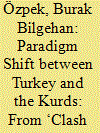|
|
|
Sort Order |
|
|
|
Items / Page
|
|
|
|
|
|
|
| Srl | Item |
| 1 |
ID:
159234


|
|
|
|
|
| Summary/Abstract |
Throughout the history of the Turkish Republic, its military and political elites in Ankara have regarded the Kurdish question as a security issue. Therefore, initiating the ‘peace process’ with the PKK and developing intimate relations with the Kurdistan Regional Government (KRG) have been regarded as deviations from the Turkish state’s traditional policy toward the Kurdish question. However, the optimism that the peace process generated gradually has disappeared as the Justice and Development Party (AKP) in Turkey and the Kurdistan Democratic Party (KDP) in the Kurdistan Regional Government have resorted to increasingly authoritarian policies. The declining democratization performance of the AKP and the KDP has deepened the internal divisions in both societies and bilateral relations between Turkey and the KRG have transformed into inter-governmental solidarity rather than institutional peace. Since the end of the ‘peace process’ following the June 7 national elections in 2015, the AKP has refused to deal with its country’s Kurdish actors, which, it says, are linked to the PKK and its ideology. Meanwhile, the AKP’s increasingly authoritarian policies have excluded non-AKP voters’ views from the policy-making process. Therefore, the cooperation between Turkey and the KRG has excluded half of the Turks and the Kurds at best. Consequently, the traditional ethnicity-based confrontation between the Turks and Kurds has been replaced, on the one hand, by an alignment among the AKP, the conservative Kurds of Turkey, the KDP and its allies in Northern Syria, and on the other hand, are the Peoples’ Democratic Party (HDP), the Patriotic Union of Kurdistan (PUK), Gorran, the Democratic Union Party (PYD) and some sections of the secular, middle class and Turks discontented with the AKP regime.
|
|
|
|
|
|
|
|
|
|
|
|
|
|
|
|
| 2 |
ID:
158733


|
|
|
|
|
| Summary/Abstract |
A revisionist tone that has created several crisis has become more pronounced in Turkish foreign policy. This trend has been particularly evident after 2010 when the AKP consolidated its power base, the military's tutelage over politics subsequently disappeared and the Arab Spring opened a new window of opportunity for Turkey in the Middle East. This has been surprising because de-militarization of political space was envisioned to produce more cooperative stances in the globalized post-Cold War world. This trend has occurred alongside what many would argue has been the AKP's authoritarian and Islamist agenda. Such an argument suggests that earlier the AKP had pragmatically used democratic values and integrationist policies to weaken the military, and then adopted Islamism in foreign policy and authoritarianism in domestic politics. This study aims to explore the common characteristics of the AKP in domestic and international realms while the extant paradigm tends to divide the AKP period into two categories, which are democratic/pro-western and authoritarian/Islamist. In order to suggest a common characteristic to identify the AKP's domestic and foreign policy in a holistic manner, this article applies the term ‘populism’ to describe a number of AKP policies and positions.
|
|
|
|
|
|
|
|
|
|
|
|
|
|
|
|
| 3 |
ID:
135285


|
|
|
|
|
| Summary/Abstract |
De facto states are regarded as political authorities functioning within a certain territory without international legal recognition. However, de facto states aim to gain the recognition of other states in order to be considered legitimate actors in the international system. There are two main contending approaches that attempt to explain the factors motivating third-party states' recognition behavior. The realist approach argues that national interest shapes the recognition strategy of third-party states while the liberal argument highlights the role of democracy in the recognition process. This article tests the validity of hypotheses derived from these two approaches through an examination of third-party states' levels of democracy and data regarding their recognition of de facto states since 1991.
|
|
|
|
|
|
|
|
|
|
|
|
|
|
|
|
|
|
|
|
|